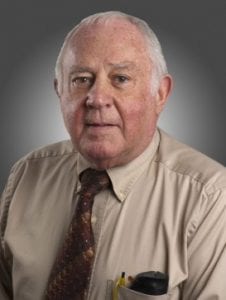Charter Faculty Member Provides Perspective On UCF Overcoming Historical Challenges

We hear “unprecedented times” often as the coronavirus pandemic unfolds through 2020 and into the next year. But someone with the long lens of history like Professor Emeritus Robert Bledsoe, Ph.D., a charter faculty member of UCF, can attest this is far from the first challenge the university has faced.
“This university has weathered a lot of storms,” said Bledsoe, who started teaching Political Science at what was then Florida Technological University (FTU) in 1968. “It’s true we’ve never seen anything quite like this pandemic. But UCF has a knack for surviving just about any situation.”
Take for instance the Challenger explosion in 1986, an event he vividly recalls. As a university founded to serve as a talent funnel for up-and-coming engineering and space sciences students, the tragedy hit the campus hard.
“The day the Challenger exploded was a traumatic day for the faculty and student body at UCF,” said Bledsoe. “I remember driving down University (Boulevard) and seeing the Challenger explode in the sky. My heart sank.”
The tragic event rocked not only UCF, but the entire nation. Faculty and staff used the tragedy as positive forward momentum to restructure programs with the hopes of producing a generation of graduates well-equipped for careers in the physical space sciences.
“We put together a space minor program following the explosion,” said Bledsoe. “I got fairly involved with that and over the years our courses in the space sciences have really grown. We even teach Space Law now.”
UCF also withstood the fall of the Berlin Wall, an event that changed university academics overnight in 1989 — especially the former Department of Political Science (the department became a school in 2019.)
“We never visualized that there’d be a situation where the international system would change so rapidly,” said Bledsoe. “All of a sudden the wall falls, Germany is a united front, China adopts a mixed economy…I had to tear up all of my lecture notes and start from scratch. This shakeup was necessary though because we were getting much too used to the status quo. When reality becomes something we’ve never known, we have no choice but to become students ourselves again.”
In fact, it’s the status quo that Bledsoe points to as the antithesis of what the University of Central Florida is today.
“When we first began as Florida Technological University, we had a very small, conservative student body. There wasn’t much diversity and there were few international students,” said Bledsoe. “If you look at us now, we are the direct opposite of what we started out as. All we’ve done from the very beginning is grow, both as an institution and as an inclusive, academic safe haven.”
As COVID-19 has progressed and affected universities across the nation, Bledsoe is sure that both students and faculty are well-equipped enough to handle the change.
“We have become a leading university in online education and with everything shifting to virtual modes, I feel we are equipped enough to handle this,” said Bledsoe. “With any change there are challenges, but we have some very adept students and faculty.”
From 1200 students at the conception of FTU to an institution now brimming with over 70,000 students from different backgrounds, places, and concentrations, the University of Central Florida is here to stay and more importantly, here to grow.
“There will always be challenges,” said Bledsoe. “But for those of us who have been here since the creation, it’s been a warm experience watching our approaches to these challenges evolve.”
If you’ve enjoyed the teaching and fellowship of Dr. Bledsoe over the years, consider a gift to the scholarship named in his honor and support the success of Political Science students.
